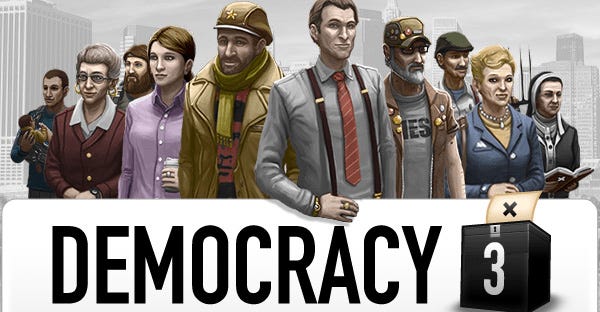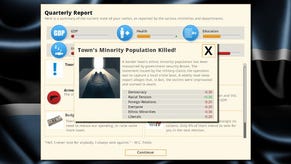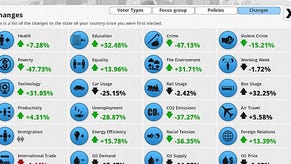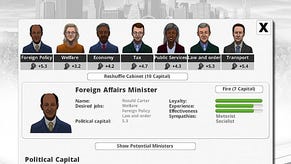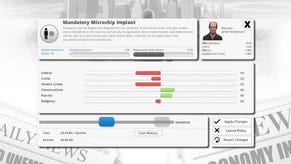Democracy 3: Everybody Wants To Ruin The World
I'm so, so sorry
I've been playing an early, unfinished version of Positech Game's government sim/political strategy game Democracy 3.
I really did want to make Britain a better, happier place for everyone. Trouble is, no-one else agreed. I compromised my own values and I punished people who were just like me, I scrimped and I saved and I took desperate actions. I tried to think long-term, but I also fought seemingly endless short-term fires. The middle-class hated me, the rich abused every tax loophole they could find, the poor took to alcohol abuse and crime. The socialists and greens cheered me, sure, but that didn't matter a jot as the nation's money haemorrhaged its last, and the public understandably voted for the other guy. I tried to help them all, and they all hated me for it.
Professor Brian Cox and his mates were dead wrong. Things can only get worse.
Perhaps the most immediately striking thing about Positech's latest government sim is that it's full of maths. I will presume it's maths based on research rather than wild speculation, but in any case it's game built upon a vast array of adjustable numbers, each of which has cause and effect on at least half a dozen other numbers. Raise luxury goods tax, for instance, and you'll see the nation's deficit reduce somewhat, the socialists and poor will cheer you on and, in theory, there'll be more emphasis on domestic rather than international products. But the middle class will be furious that their iPads cost more, foreign investors might shy away and quite frankly it'll all go to hell in a half-dozen ways you probably hadn't expected.
Another example - hybrid cars and alternative energy sources are all jolly nice on paper, but what possible use are they if they can't bandage up a nation's bleeding budget right away? All these groups and sub-groups of people, all with their different needs, so many so contrary to what others desire. So much juggling. Can it ever possibly work, is there any balance, some perfect set of numbers? I don't know, but I can't very well just give up, can I?
That's the maths, but the other and perhaps more affecting aspect of the game is the morality simulation. I went in with a pretty fixed idea of what I hoped to achieve and what I'd come to believe after years of reading liberal media and saying 'if they'd only do this now then that'll happen later' from the comfort of my armchair/Twitter client. I was barely a year into my first term by the point I'd thrown most of my beliefs to the wind and was trying almost anything to appease the whinging middle and the greedy posh or worse, simply to pull more money into the implacable maw that was the national deficit. I even raised university tuition fees. In other words, I became...
Well, let me put it this way. Back before we rather ran out of retro tales, we talked often of our all-time gaming highs on RPS. Today, I suffered one of my all-time gaming lows. I became the ashen-faced, sad-eyed, word-breaking, forever compromising leader of the UK Coalition government's junior partner. God help me, I became Nick Clegg.
I'd like to take this opportunity to put a few things straight.
Entirely understandably, the people voted me out at the end of my first turn, but while that spelled obscurity for that prime minister character, it grew my own determination. I would try again. Somewhere, in Democracy 3's initially overwhelming but careful and slick matrix of numbers, sliders and modifiers, taxes and subsidies, policies and injustices, there was surely a way. A way to make things better, to get through the recession, to solve unemployment, to be popular enough to survive even though the rich had to forsake their fourth houses.
The power of Democracy 3 is that it'll rip your soul right out of you, but without convincing you that your beliefs are actually wrong. What it will do is make you into a liar. Well, a politician, but same difference, right?
All snark aside, Democracy 3 is very much a game of its time. It evokes the panic and precariousness of the financial crisis in Britain (the US and other nations will be added later), the desperate sense that whoever winds up in Downing Street to try and fix it is very much inheriting a poison chalice. This isn't politics as jolly hockey sticks, it's politics as a fight against rapid entropy. It's highly stressful, in all the right ways.
On a visual and interface front, I'm impressed by how it's managed to prevent its numbers - for all it really is is numbers, and their meanings - from becoming overwhelming, and it doesn't even need to do the one-note bobblehead gag of sometime, far shallower rival The Political Machine, in order to do this. It feels clean and shiny, a little bit Maxis in its interface. Things happen, in a pleasingly visual and sometimes almost tactile way, when I click on or hover over screen elements, rather than it being a matter of staggering through dry text boxes.
That said, I think perhaps the main screen, with its array of every socio-economic factor in the game, each presented as a clicky round button (only around a quarter of which are visible in the image above), does mean some visual overload, and perhaps would be better off split into one category (i.e. tax, economy, public services etc) per screen rather than trying to show absolutely everything at once, but then again I worked it all out after a time and it wasn't long before I'd memorised what most icons meant. I also found my ministers to be distractingly inactive, essentially waiting for me to fire or hire them but offering no input on policy, but then again I should be grateful for a megalomania sim after all these years of being spoilt by Civ's chatty advisors.
What I'm saying is that it hangs together very well: deep and detailed, researched and pitiless, but loaded with enough consequence and meaning to lift it into something much more than a numbers game. It's very much a roleplaying game, as much about the curse of power as the strategic practicalities of running a vast business. I'm looking forwards to going back in and playing as The Nasty Party, seeing what happens if I privatise everything, ramp up the wealthiest's wealth and destroy the welfare state. If it turns out I have an easy ride that way, I suspect I'll reverse my opinions to date on the game, of course.
Democracy 3 will be out at some point soon-ish, probably. Keep up to date with its development on Cliffski's blog.
